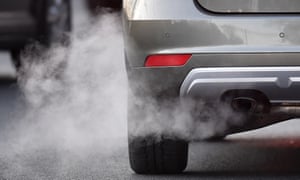Almost three-quarters of motorists also think toxic air in their area is damaging their health

Sales of diesel vehicles are plummeting in the UK.
Photograph: Martin Meissner/AP
More than half of UK motorists think diesel cars should be banned from urban areas due to air pollution concerns, according to a new opinion poll.
The proportion backing a ban rose to 80% when drivers were asked if diesel cars should be excluded areas around schools and hospitals. Nearly a third said diesels should be banned from all roads.
Concern about the harm caused by air pollution was high, with 70% of drivers believing that exhaust fumes in their area were damaging their health. The poll was conducted online with 2,000 people by Censuswide for Slater and Gordon, a law firm that is representing 45,000 motorists in a group action against Volkswagen over the emissions scandal.
New government figures published on Wednesday estimated that between 28,000 and 36,000 people die early each year in the UK due to air pollution, which was declared a public health emergency by a cross-party committee of MPs in 2016. Most urban areas in the UK have since 2010 had illegally high levels of nitrogen oxides (NOx), emitted by diesel vehicles.
The government has been defeated three times in the court over the inadequacy of its plans, and the latest version in 2017 was condemned as “woefully inadequate” by city leaders and “inexcusable” by doctors.
Sales of diesel vehicles are plummeting in the UK, with July data showing a 30% plunge in 2018 so far. Drivers are concerned about air pollution and fear future restrictions on diesel use, such as the £10 surcharge now being levied on older polluting vehicles entering central London.
Some of the very latest diesel models produce very low NOx emissions. But many still on sale are highly polluting, with the worst producing 15 times more toxic gas on the road than the official lab-based limit and creating a “nightmare” for buyers, according to experts.
The new poll shows the public have little faith in diesel cars, with 70% of drivers believing they were were “mis-sold” as clean, and three-quarters saying regulators should be given powers to take cars off the road immediately if they fail newly introduced on-the-road emissions tests.
“Motorists wanted cars which were clean, green and efficient and are now starting to realise they were sold a lie and their cars don’t live up to the promise,” said Gareth Pope, head of group litigation at Slater and Gordon. “This survey has shown that the VW emissions scandal, and revelations about what lengths the manufacturer went to cheat clean air tests, has had a hugely negative impact on the entire industry.”
Morten Thaysen, clean air campaigner at Greenpeace, said: “Diesel cars have been fuelling a major air pollution crisis that has made our cities’ air toxic and harmful to breathe. We need a rapid switch to electric by the car industry to help clean up our air and protect our climate.”
Since the “dieselgate” scandal broke in 2015, VW has paid out billions of dollars around the world in compensation to motorists whose cars had been fitted with “defeat devices” to cheat emissions tests. But UK motorists have not yet received any compensation.
Will Hanrahan, a former BBC journalist and one of the motorists represented by Slater and Gordon, said: “I’m surprised the government hasn’t stepped in and we’re having to take action against such a large corporation ourselves. It’s like David versus Goliath.”
Mike Hawes, chief executive of motor trade body SMMT, said: “As the government says, ‘cleaner diesel cars and vans can play an important part in reducing carbon dioxide emissions during the transition to zero emission vehicles’.”
He said any ban would risk undermining the sales of new, cleaner cars: “Modern diesels will remain the right choice for many drivers for some years to come, providing affordable motoring to millions of people, particularly long-distance drivers.”